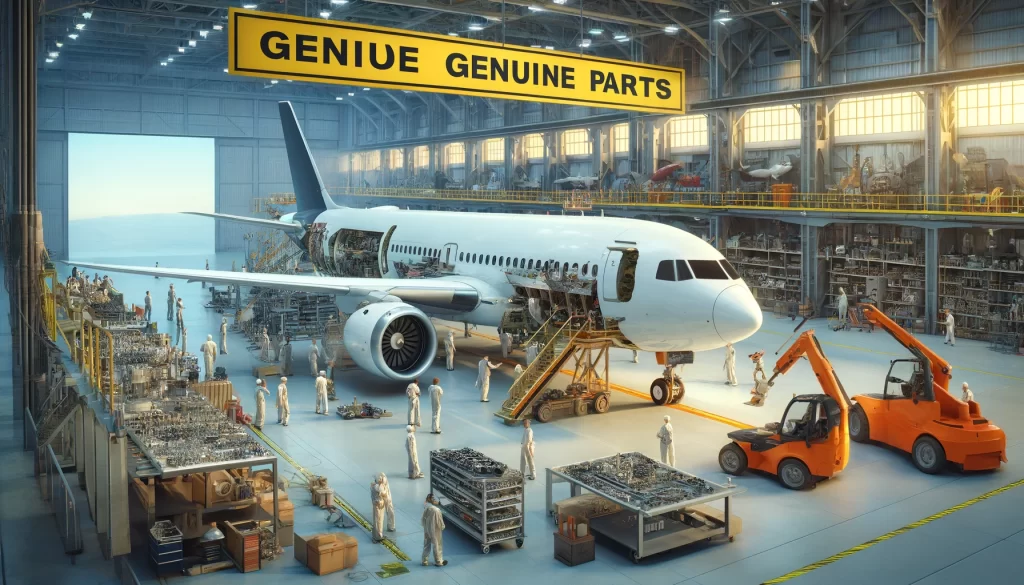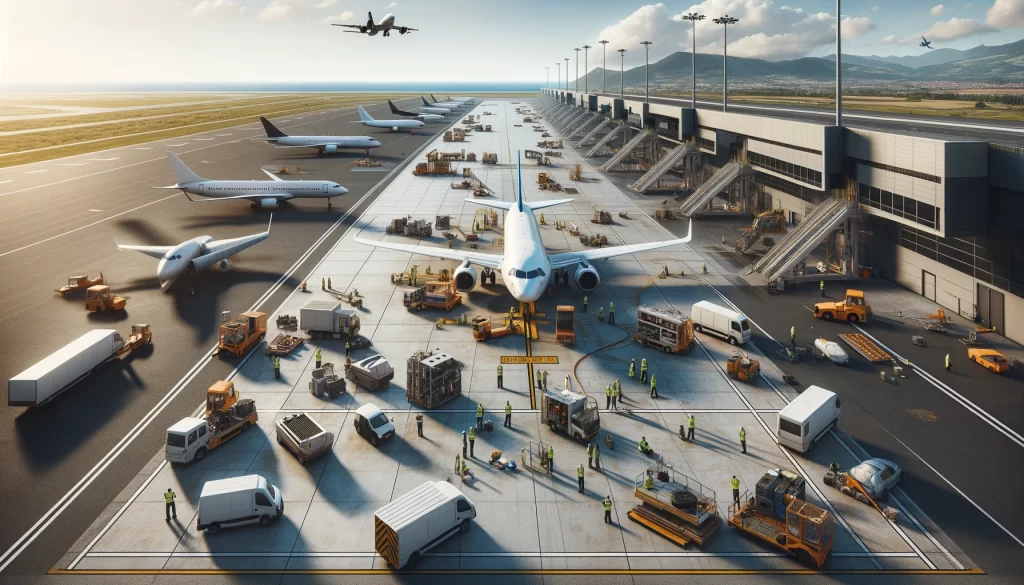Introduction to the growing demand for quality airplane main components in Europe, setting the stage for a detailed discussion on the importance of reliable suppliers and the impact of genuine parts on aircraft maintenance and safety.
The Importance of Genuine OEM Aircraft Parts
- Understanding OEM and its Impact on Aviation Safety
- Summary: Explains what OEM parts are and why they are crucial for maintaining the safety and integrity of aircraft operations.
- Comparative Analysis of OEM vs. Non-OEM Parts
- Summary: Provides a detailed comparison between OEM and aftermarket parts, highlighting the risks and long-term costs associated with non-OEM components.
The European Aviation Components Market
- Overview of the Market Dynamics
- Summary: Discusses the current landscape of the aviation components market in Europe, including major suppliers and market trends.
- Role of European Regulations in Aviation Safety
- Summary: Explores how European aviation regulations influence the quality standards of aircraft parts and component suppliers.
Selecting the Right Aircraft Spare Parts Suppliers
- Criteria for Choosing a Supplier
- Summary: Outlines the key factors that airlines and maintenance companies should consider when selecting a supplier for aircraft parts.
- Spotlight on Leading Suppliers in Europe
- Summary: Provides insights into some of the top aircraft spare parts suppliers in Europe, highlighting their strengths and specialties.
Aviation Components Trading and Distribution
- The Logistics of Aircraft Parts Distribution
- Summary: Describes the logistics process in the aviation parts distribution chain, from order to delivery.
- Innovations in the Spare Parts Marketplace
- Summary: Discusses technological advancements and innovations that are transforming the aviation spare parts marketplace.
Case Studies: Success Stories in Aircraft Maintenance Parts
- Examples of Successful Maintenance Strategies
- Summary: Presents case studies of airlines and maintenance companies that have successfully implemented effective parts management and maintenance strategies.
- The Role of Reliable Aerospace Components in Fleet Management
- Summary: Analyzes how dependable components contribute to efficient fleet management and operational reliability.

Introduction
The European aviation sector is experiencing a pivotal transformation driven by an escalating demand for quality airplane main components. As airlines continuously seek to enhance operational efficiency and safety, the reliance on trustworthy aircraft spare parts suppliers becomes paramount. This article delves into the critical aspects of aviation components trading, focusing on genuine OEM parts and their unparalleled importance in maintaining the highest standards of aircraft performance and safety. By exploring the dynamics of the European market and the stringent regulatory landscape, this discussion aims to offer unique insights that go beyond commonplace industry discussions.
The Importance of Genuine OEM Aircraft Parts

Understanding OEM and its Impact on Aviation Safety
Original Equipment Manufacturer (OEM) parts are crafted specifically by the airplane manufacturer or its licensed producers. These components are crucial because they guarantee a match in design specifications and material integrity, directly impacting aircraft safety and efficiency. Unlike aftermarket parts, OEM components undergo rigorous testing and certification processes, ensuring they meet exact safety and operational standards. This section will dissect how using genuine OEM parts reduces the risks of mechanical failures and enhances the overall safety of flights.
Comparative Analysis of OEM vs. Non-OEM Parts
The debate between using OEM and non-OEM parts is significant in the aviation industry. While OEM parts are typically more expensive, they offer long-term benefits that non-OEM parts often cannot match, including guarantees of quality and compliance with safety regulations. This part of the article will explore real-world data and expert opinions to compare the total cost of ownership, including maintenance costs, downtime, and the potential risk associated with using cheaper, non-certified parts.
FAQs
- What are the main differences between OEM and aftermarket aircraft parts?
- OEM parts are made by the aircraft’s original manufacturer or its authorized producers, ensuring a perfect fit and compliance with safety standards. Aftermarket parts, while often cheaper, may not always meet these rigorous standards and can vary in quality.
- Why are OEM parts generally more expensive than non-OEM parts?
- The higher cost of OEM parts reflects the extensive testing and certification processes they undergo to meet specific safety and performance standards set by aviation authorities, ensuring reliability and longevity.
- Can using non-OEM parts affect an aircraft’s warranty?
- Yes, using non-OEM parts can potentially void warranties provided by the aircraft manufacturer, as these parts may not be certified or approved by the OEM, leading to possible conflicts in liability and insurance claims.
The European Aviation Components Market

Overview of the Market Dynamics
Europe’s aviation components market is complex and influenced by factors such as regulatory changes, technological advancements, and the economic climate. This section will outline the current market landscape, identifying key players, market size, and growth trends. It will also touch upon how shifts in airline fleet compositions influence the demand for specific types of components.
Role of European Regulations in Aviation Safety
European aviation is governed by stringent regulations designed to ensure the utmost levels of safety and reliability. This subsection will highlight how these regulations affect the sourcing and distribution of airplane parts, discussing specific directives and standards enforced by the European Aviation Safety Agency (EASA). The implications of Brexit on the UK’s component supply chain will also be examined to provide a comprehensive overview of regulatory impacts.
FAQs
- How do European regulations impact the aviation components market?
- European regulations ensure that all aviation components meet strict safety and quality standards before they are sold or installed. Compliance with these regulations is mandatory for suppliers and manufacturers, influencing market dynamics significantly.
- What role does EASA play in the European aviation components market?
- The European Aviation Safety Agency (EASA) sets regulatory and certification standards for aviation components in Europe, overseeing their implementation to ensure the highest safety levels across the industry.
- Has Brexit affected the aviation components market in the UK and Europe?
- Brexit has introduced some logistical and regulatory challenges in the trade of aviation components between the UK and EU countries, affecting tariffs, supply chain processes, and regulatory alignments.
Selecting the Right Aircraft Spare Parts Suppliers

Criteria for Choosing a Supplier
Selecting the right supplier is a critical decision for airlines and maintenance companies. This section will list essential criteria such as certification, product range, supply chain logistics, and customer service. It will also discuss the importance of supplier audits and the role of digital platforms in facilitating transparent and efficient supplier evaluations.
Spotlight on Leading Suppliers in Europe
Europe hosts some of the world’s most reputable aircraft spare parts suppliers. This subsection will introduce key players who have established a reputation for reliability and excellence in the industry. It will cover their history, specialty areas, and how they maintain high standards in quality and compliance.
FAQs for Selecting the Right Aircraft Spare Parts Suppliers
- What criteria should be considered when selecting an aircraft spare parts supplier?
- Important criteria include certification, compliance with safety standards, reliability, supply chain efficiency, and customer support. Companies should also consider the supplier’s technological capabilities and responsiveness to market changes.
- How important is it for suppliers to have digital capabilities?
- Digital capabilities enhance transparency, efficiency, and accuracy in ordering and supplying parts. Suppliers with advanced digital platforms can offer better inventory management, tracking, and customer service.
- What is the benefit of conducting supplier audits?
- Supplier audits help ensure that suppliers meet contractual obligations and maintain the standards required for quality control and regulatory compliance. Audits can identify potential issues before they affect production or supply chains.
Aviation Components Trading and Distribution

The Logistics of Aircraft Parts Distribution
The distribution of aircraft parts is a logistical challenge that involves careful planning and execution. This part of the article will describe the supply chain logistics from manufacturing to delivery, highlighting how efficient practices can reduce turnaround times and costs.
Innovations in the Spare Parts Marketplace
The digital transformation is reshaping the aviation spare parts marketplace. This subsection will explore innovative solutions such as blockchain for parts tracking, AI in inventory management, and online platforms that are revolutionizing how parts are bought and sold.
Success Stories in Aircraft Maintenance Parts

Examples of Successful Maintenance Strategies
Practical examples and case studies of airlines and maintenance companies will be discussed here, showcasing their strategies for managing parts inventory and maintenance schedules. These success stories will highlight best practices and lessons learned in achieving operational excellence.
The Role of Reliable Aerospace Components in Fleet Management
This subsection will examine how high-quality, reliable components are integral to effective fleet management. It will discuss the impacts of component reliability on overall fleet efficiency, safety, and cost management.
Conclusion
This article has traversed the critical facets of the aviation components industry in Europe, emphasizing the pivotal role of genuine OEM parts in maintaining aircraft safety and performance. As the aviation sector continues to evolve, the insights provided here underscore the importance of strategic supplier selection and the adoption of innovative technologies in the parts supply chain. For airline operators and maintenance firms, prioritizing quality and reliability in their components is not just a regulatory requirement but a fundamental business strategy that guarantees long-term success and safety in the skies.
